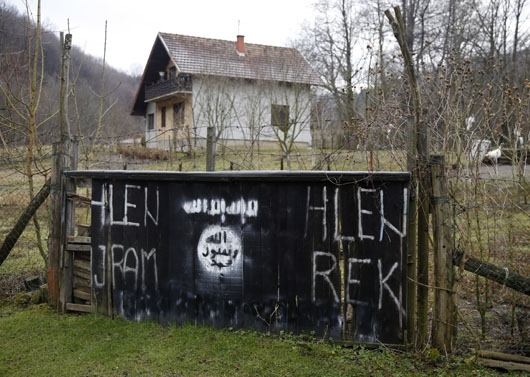by WorldTribune Staff, June 15, 2017
The West is ignoring the increasing numbers of Islamic State (ISIS) jihadists who are returning to “safe havens” provided by Muslim-majority Bosnia and Herzegovina, a report said.
Bosnia has “put out the welcome mat to the foreign fighters, making it clear that shelter is available to them,” The Daily Caller News Foundation’s Investigative Group reported on June 14.

“Yet U.S. and European leaders have done nothing about the safe havens. There have been no calls for providing vital counter-terrorism intelligence to local governments that are eager to stem the growing jihadist activity within their borders.”
The safe haven enclaves, known as “Jamaats”, permit jihadists to “rest, change identities, obtain weaponry, gain easy access to laundered money and surreptitiously enter Western European nations,” the report said.
“Bosnia is a way station, it’s a resting area for those who tend to do harm in the West,” Henry Jones, an adviser to Serbia’s president from 2007 to 2013, told The Daily Caller.
The Jamaats, financed by wealthy Iranian and Persian Gulf businessmen, “are strictly off-limits” to local Balkan governments, police or intelligence services, the report said.
“The real issue is that no one seems to know what happens inside these areas,” Jones said. “They have their private security forces. The police usually don’t go in. And you don’t go in if you’re an outsider.”
More than 60 of the 200 Jamaats operate in Bosnia. The other neighboring Balkan countries harboring terrorists in the special enclaves are Kosovo, Macedonia, Albania and Serbia’s Sandzak region.
Bosnia and Herzegovina was formerly part of Yugoslavia, one of the Soviet Union’s Eastern European satellites.
Bosnian Muslims, known as “Bozniaks,” provide the largest number of ISIS fighters per capita of any European nation, the report said. Youth unemployment in Bosnia, at 60.2 percent in 2016, is among the highest in the world – higher than youth unemployment in Yemen, Tunisia or the Gaza Strip.
Jamaats have hosted international terrorists since the 1990s when civil war wracked the region. The Clinton administration invited members of Afghanistan’s Mujahedeen to Bosnia to defend the Muslim population during the war.
The Islamic fighters were supposed to leave after the adoption of the Dayton Peace Accords in 1995, but many stayed behind in the enclaves.
“They (the West) allowed the Arabs to set up enclaves in and outside of Sarajevo,” Jones said. “There are villages that are essentially populated primarily by the fighters that came for the war; the Mujahedeen and are still there.”
Gordon N. Bardos, president of SEERECON, a strategic advisory and political risk-analysis firm for clients doing business in southeast Europe, said that biggest terror attacks against the United States – including the Sept. 11, 2011, attacks – all had Bosnian ties.
“We’re talking about people involved in the 9/11 bombings. We’re talking about guys involved in the USS Cole attack. We’re talking about guys who were involved in the U.S. Embassies in Africa back in August of 1998. All these guys were operating in the Balkans in the 1990s. And they kind of sowed the seeds for a lot of what we’re seeing now,” Bardos said.
The late Richard Holbrooke, the U.S. diplomatic official who was the key negotiator for the Dayton Peace Accords, once said that if the civil war had not ended in Bosnia, “9/11 would probably have been planned in Bosnia, not in Afghanistan.”
Bosnia also has played a major role in the recent terrorist attacks in Europe.
“Historically, when we look at various terrorist attacks, the Christmas market bombing in Berlin last year or the Charlie Hebdo attacks in Paris or the Brussels metro attacks, there has always been a Balkan link,” said Bardos.
Abdelilah Himich, the suspected ISIS mastermind of the November 2015 Paris attack and the March 2016 Brussels attack, lived in the Balkans. Weapons and ammunition in the Paris attack came from Bosnia.
Bosnian resident Nassar bin Ali Ansi took credit for the January 2015 Charlie Hebdo attack in Paris. Later Ali Ansi became a leader of Al Qaida in the Arabian Peninsula.
Col. Tim Heinemann (Ret.), a 31-year Army Special Forces veteran who was dean of academics of the U.S. Staff College and who served in Bosnia as a joint military commissioner, told the Daily Caller that European leaders and former President Barack Obama ignored pleas from Serbian President Milorad Dodik.
“A succession of American ambassadors has been blocking the Republic of Srpska’s (Serbia’s) ability to develop an intelligence capability and a counter-terrorism ability,” Heinenmann said. “They’ve made it difficult for them to get training, to get equipment.”
Jones told TheDCNF the Obama administration took no action to end the growing Balkan Jamaats.
“This was Obama policy: it was the most hands-off policy I’ve ever seen in my life,” he said.
Letters to the Editor __ Subscribe to Geostrategy-Direct __ Support Free Press Foundation
